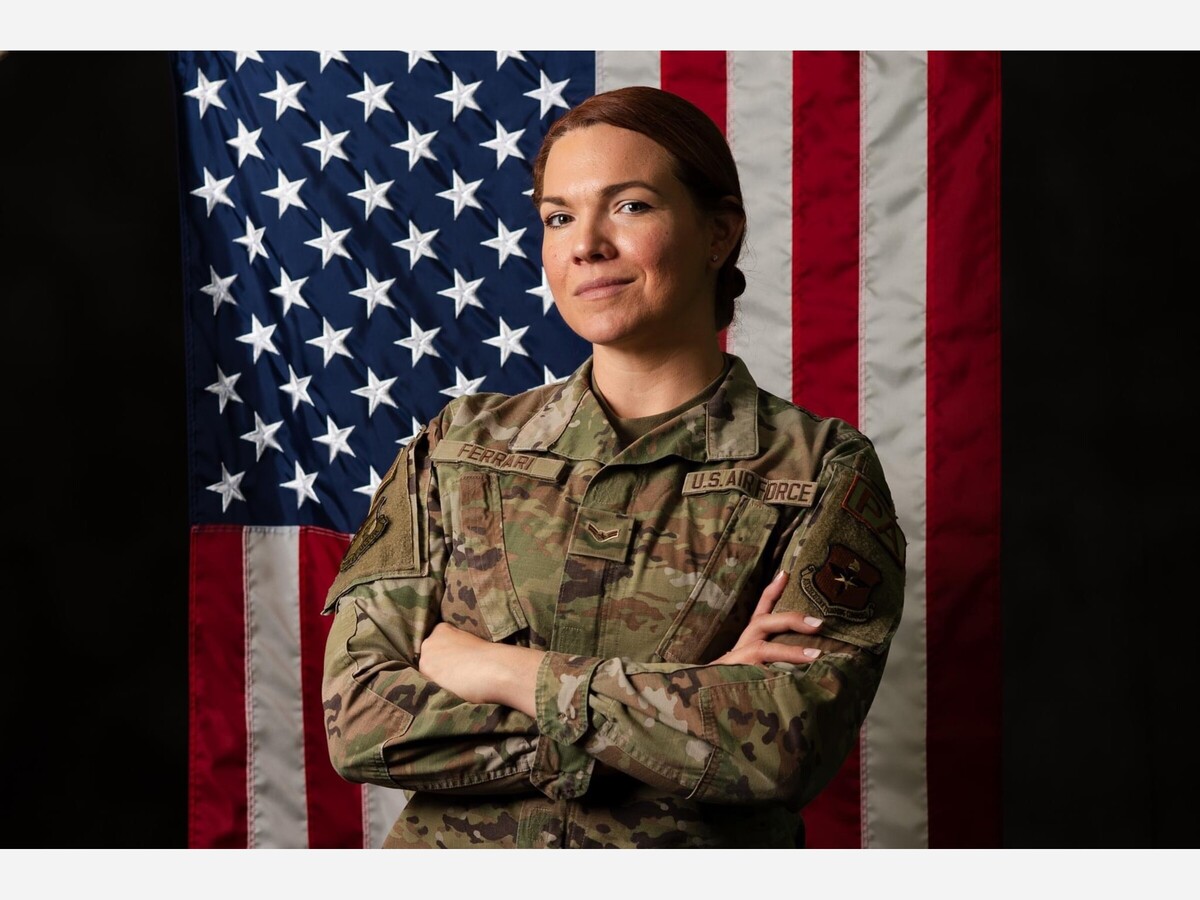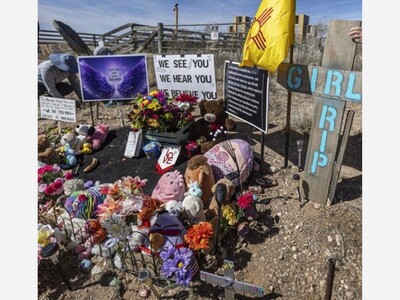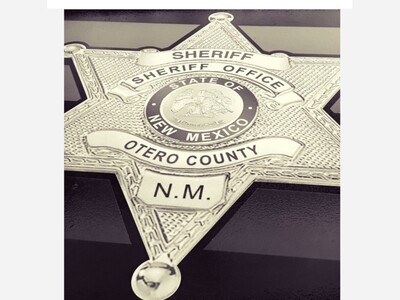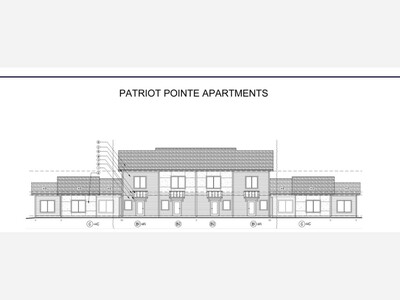This guest commentary is offered to our community and the Holloman community by Airman 1st Class Michelle Ferrari 49th Wing Public Affairs.
Trigger Warning: This article contains references to violence. This is my story of overcoming sexual assault, suicide, domestic violence, and oppression. If you or someone you know is impacted by sexual assault, family or domestic violence, call 1-800-RESPECT or 1800-737-7328.
I work in public affairs as a mother of four and am forty years old. I joined the US Air Force when I was 38 years old. My life's purpose aligned with their basic principles of honesty, quality, and service before self, which made joining the military a great professional choice. For ten years I was a stay-at-home mother; prior to that, I worked as an interpreter, an English teacher in Brazil, a co-owner of a transportation company that I helped launch, and in the marketing and healthcare sectors. I also developed a strong interest in managing a nonprofit ministry that supports abuse victims. This is my Air Force story; why despite my difficult life experiences and many jobs I had, I chose to become an Airman.
The life experiences I endured and how I overcame them shaped me into the resilient woman I am today. I learned through pain how to survive, how to persevere, how to grow, how to treat others with compassion and how to forgive. Through these challenges, I discovered how rewarding life can be when you hold on to hope because the majority of the time, unfavorable events in life that appear to be permanent are only transitory.
The day my innocence was taken from me, I was sixteen years old. The fact that it was happening astounded me. I was being restrained against my will, but my survival instincts took over and I complied, experiencing an out-of-body sensation and turning into a zombie. "Just take it," he added. At the same moment, I could feel my heart grow angry and wanted to destroy myself. I became numb.
I healed in layers but it took time. I sat with feelings of guilt, shame, hate, anger, sadness, and disgust. I coped by listening to heavy metal music and punk rock. There was something oddly soothing hearing the screams through the tunes. I felt as if they were mine.
While I didn’t allow the traumatic event to change who I was, it felt like I was navigating life with a broken compass and a bruised heart. I focused on how I could help others in need through ministry and acts of service in my local community. Helping others helped me feel worthy.
The way I persevered through my life’s challenges prepared me to go through boot camp twenty-two years later and overcome challenges beyond the physical.
Boot camp triggered me but not the way most people would expect. The physical demands and responsibilities didn’t bother me, the exhaustion didn’t phase me, and the day-to-day yelling from my military training instructor normally rolled off my back. But one morning it was different.
On this day, one of my military training instructors, who was a male, pounded on the dormitory door screaming, “LET ME IN!”
Boot camp is intended to put participants through physically and mentally taxing tasks. Stressing out trainees is a regular practice, but something about this particular occasion struck me deeply.
It was the combination of those words and his voice that sent chills down my spine. I froze in fear as my heart pounded through my chest. I felt sick to my stomach. My heart raced as he continued to pound on the door and I flashed back to one of the toughest years of my life, when my abuser tried to break down the door, demanding I let him in after finding out where I was staying when I left him, desperately attempting to get me to come back to him. Triggers can be a confusing phenomenon. Although I had worked through them a decade prior to basic military training, they still sparked intense emotion from within.
My abuser was a man I met at twenty-seven years old in San Francisco. I fell in love with him and the idea of living in my dream city. Together we built and ran a sightseeing business; it was everything I thought I wanted but it didn’t last.
Over time he became controlling with the final say on everything from our finances to my clothes. He became degrading, destructive, violent, and reckless. For a long time I was in denial, even making excuses for him. It was extremely difficult to accept the reality of who he truly was because of the few moments when he apologized or made romantic gestures. It was easier for me to overlook his behavior and to forgive him than to leave him.
I left him the day he ripped a chunk of hair out from my head, sexually assaulted me and attempted to run me over with his car. It was violent. Despite this, I remember looking him straight in the eyes and saying, “I forgive you.” I wanted to make a clean exit, and for me, forgiving him before I walked away for good was the first step.
I filed a restraining order against him, later discovering I was the third woman to do so.
He stalked me around town and hacked into my laptop. I reached out for help in this new city, but people turned their backs on me, often taking his side, as he was very convincing in appearing as a victim. I was constantly rejected by those whom I asked for help. Doors were slammed in my face and police officers questioned my motives. Waiting on the court date of the trial was time-consuming and I found myself in an incredibly dark place. The Golden Gate Bridge has a grim reputation as one of the highest suicide locations in the world. I thought about ending my life. These thoughts flashed me back to the past where a late friend of mine took his life.
It was at that point that I had an awakening, bringing me back from my despair. I thought about protecting the next girl. I couldn’t let him get away with this type of behavior. Justice had to be served.
I cried myself to sleep every night but still moved forward with faith that my suffering wouldn’t go in vain. I didn’t belong in California anymore but I chose to stay until the trial was complete.
I found shelter through a domestic violence advocacy program and was provided a pro-bono lawyer to defend me in court while being interrogated by his criminal defense attorneys during an excruciating four-hour trial. Surviving an abusive relationship was one thing, but surviving the trial took some serious perseverance and determination to push through. It was extremely triggering. I was revictimized as I was judged, criticized, mocked, and belittled, but I was lucky. I won the case. Not many are.
I then left San Francisco to study theology in Oregon. The experience I gained from the time I spent at this school was educational, fulfilling, and healing. It also led me to seek the help I needed through therapy. I learned to forgive myself and fall in love with life again by helping others. I founded a non-profit ministry and collaborated with local churches, domestic violence shelters and law enforcement agencies to help victims of abusive relationships. I did this by sharing my personal story, raising community awareness and funds to aid the program.
I became a part of a sisterhood that nobody wants to join. It’s a lifetime membership. I will forever relate to those who are going through the same experiences, like the young women who relied on my advice during tough times during boot camp, particularly on the night after a sexual assault prevention course that was mandatory during training. Many women were triggered by that class because it brought up their previous and current traumas. They were frantic to share with someone who understood and cared. That's when I realized there were women in the military who needed me, and who would need my advice going ahead.
“You don’t look like what you’ve been through,” said a fellow wingman. I smiled and asked her, “How is it supposed to look?” She didn’t know to how reply. I’ve been told this before on several occasions. I realized my ministry would continue in the U.S. Air Force. I implement this regularly by telling Airmen’s stories, along with the big Air Force mission, through journalistic creativity with Public Affairs. It’s a dream job for me.
Many think our job is limited to photography, like taking official photos, but it’s more than that. It’s mentally challenging. We are responsible for maintaining a public image while remaining transparent and truthful. We write mission and personality features, make fun videos about events, conduct interviews and more. We are responsible for documenting crime scenes, which means photography of death, domestic violence or workplace injury. In some situations, I’ve implemented the things I learned through my previous experiences to help ease the victim when documenting a crime scene.
SAPR (Sexual Assault Prevention Response)
The SAPR office upholds the Air Force’s pledge to eradicate sexual assault by engaging in outreach efforts, conducting annual training and advocating for a zero-tolerance approach. The SAPR office is dedicated to providing outstanding support at every stage of victim reporting, response, advocacy, investigations, and holding offenders accountable in cases of sexual assault.
At Holloman, the SAPR office provides an emotional support animal, a golden retriever named Phoebe. Her presence makes the environment welcoming to those seeking comfort during times of emotional distress.
It is with great honor that I get to help aid this program within the military. I wanted to continue to be a part of the SAPR office after the teal rope program I was a part of during technical training school which led me to volunteer and be vetted to become a SAPR facilitator. By being a facilitator, I can work to promote zero tolerance through briefing SAPR policy and intervention and prevention strategies. The briefing is mandatory for all military members to attend and members must participate in a refresher every year. This helps keep Airmen, NCOs, SNCOs, officers and civilians informed and accountable as a preventative measure. As one of the SAPR facilitators for the wing, I get to continue my ministry within my military career. My personal story helps motivate me to help others in need.
Today, I wear my story of resilience as a badge of honor, and in a way, I feel like I’ve always been an Airman at heart.
I am an American Airman. I have answered my Nation’s call.
Note from the author: Don’t suffer in silence. Don’t be afraid to ask for help. You are not alone. The U.S. Air Force provides many resources. There are people who care.
If you or anyone you know is a victim of domestic violence, please contact the National Domestic Violence Hotline at (800) 656-4673.
If you or someone you know is impacted by sexual assault, family or domestic violence, call 1-800-RESPECT or 1800-737-7328.
Holloman’s SAPR 24/7 Line: 575-572-6789
Holloman’s Domestic Abuse Victim Advocacy 24/7 Line: 855-336-6833
DOD SAFE HELPLINE 877-995-5247or www.safehelpline.org
Air Force SAPR page: https://www.resilience.af.mil/SAPR/















